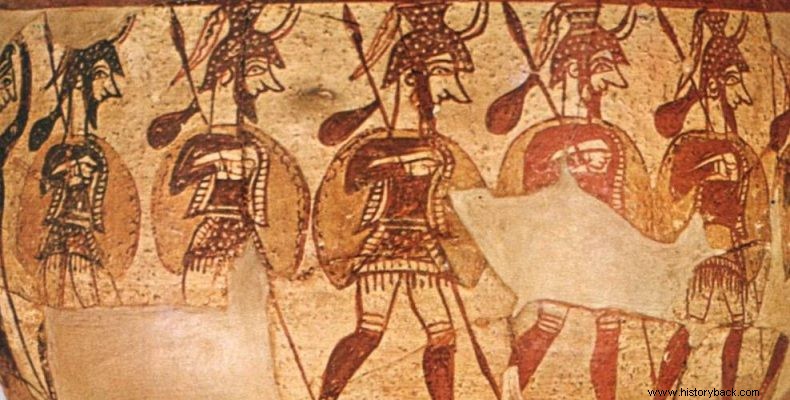
After their victory over Troy, the Greek Achaean kingdoms gradually began to collapse. They had spent the last ounce of their strength to defeat their Trojan Greek opponents. If this seems strange to some, we contrast them with the example of the Peloponnesian war, which lasted 27 years and destroyed all of Greece.
The Mycenaean kingdoms, exhausted economically and demographically, were also rocked by intense political strife, as the episodes of Odysseus and the suitors and Agamemnon, who was murdered by his wife and the descendant of the previous Atreid dynasty Aegisthus, clearly show.
The Dorians - Macedonians
The causes of the collapse of the Mycenaean world must therefore be sought in internal causes and not in the invasion of some foreign people, armed with iron weapons, as we have been told since our childhood. The infamous descent of the Dorians, the "bloodthirsty warriors with iron weapons", who come from the North to Greece and subjugate the Achaeans, only happened in the imagination of the initiators of the theory. The Dorians did not come from any North because they simply already lived in Greece, together with the Achaeans and the other Greeks.
According to the legend, the Dorians were the descendants of Doros, son of the Greek from the generation of Deucalion. His brothers were Aeolus, progenitor of the Aeolians, and Xuthos, progenitor of the Achaeans and Ionians. The Dorians, according to Herodotus (I, 56), were called Macedonians (Macedonians) when they settled in the region of Pindos, expelled from the region between Ossa and Olympus. They were called Dorians, always according to Herodotus, when they lived in the Peloponnese. However, there are other opinions about how they got this name.
The first and most prevalent has to do with the weaponry of the specific mountain Greek tribes and specifically with the dorida, a single-edged heavy cutting sword, the ancestor of the kopida of classical times. According to another version, the Dorians were named from the beginning - after their ancestor Doros - and they even gave their name to the region of Dorida (mountainous Evrytania - Phocis) in which they lived and which until then was called Dryopis.
Finally, according to another view, the less common and justifiably widespread, the Dorians were so named because they fought with spears. The Dorians, initially, do not appear to be connected with the Heracleides, the descendants of Heracles. However, their relations began to develop very early from the time when the king of the Dorians was the son of Doros Aegimios, who was associated with Herakles. In the "courtyard" of Aegimios, the son of Herakles Hyllos later took refuge, immediately after his expulsion from Mycenae, by Eurystheus.
Hillus' father, Herakles, had reinforced the Dorians in their wars against the Lapiths and the Dryopes. King Aegimios therefore received Hyllos extremely flatteringly and recognized him as his successor, together with his sons Dymanas and Pamphylos. And this fact alone proves that the Dorians did not consider the Achaeans foreigners and vice versa. After all, the mythological evidence, which wants Doros to be the brother of Aeolos (aeolos =mixed), proves that all the Greek races had already mixed, at least to some extent, with each other.
Many identify them with the Heraclides, the descendants of the hero, who fought the Peloponnesians, as early as the 13th century BC And only their connection with the Thebes in origin and a hero assigned to the service of the Mycenaeans, clearly proves their Greek and not foreign origin, as well as the fact that they existed before the destruction of the Mycenaean palaces in Greece and they certainly did not cause it.
The fearsome Dorian warriors with their iron weapons are but a myth. After all, according to Herodotus, they received the name Dorians after their settlement in the Peloponnese. Previously they were not called Macedonians, i.e. Macedonians - those whose origin is claimed by Slavs, descendants of those who arrived in the Balkans in the 6th century AD
The Spartans themselves admitted that their ancestors who came down to Laconia around 1100 BC. they numbered but a few thousand souls, a number exceedingly small to bear all the calamities which occurred. Of course, in the context of political ferment and the collapse of the old regime, it is possible that Dorians were recruited by warring Achaean princes. And why not, since they were compatriots.
